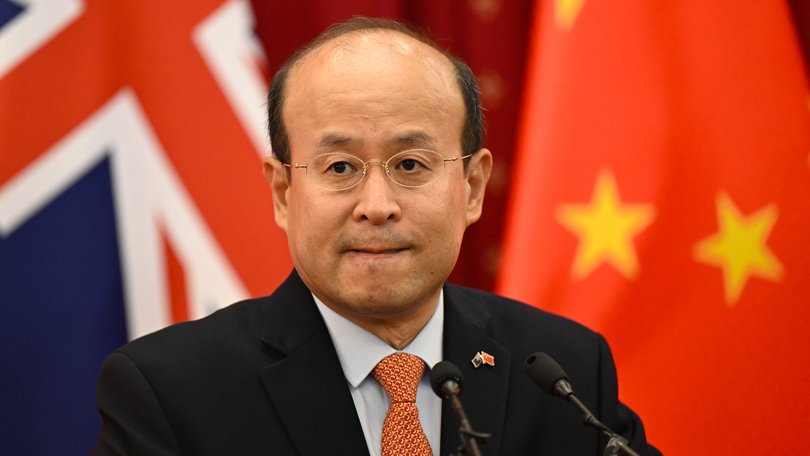Chinese ambassador Xiao Qian says Australia shouldn’t fold to demands to increase defence spending
China has warned Australia against folding to US demands to increase defence spending, with its top diplomat flagging it as a ‘heavy fiscal burden’.

China has warned Australia against folding to demands to increase defence spending, with its top diplomat flagging it as a “heavy fiscal burden”.
While not mentioning the US directly, Chinese ambassador Xiao Qian has attacked the push led by President Donald Trump, who has exerted pressure on allies to ramp up spending.
Chinese ambassador Xiao Qian said other countries had “hyped up the so-called China threat narrative” at recent international gatherings, including at the Shangri-La Dialogue, G7 summit and NATO summit.
Sign up to The Nightly's newsletters.
Get the first look at the digital newspaper, curated daily stories and breaking headlines delivered to your inbox.
By continuing you agree to our Terms and Privacy Policy.Describing this as “slander”, Mr Qian said such rhetoric fuelled the global arms race and was a threat to global peace and stability.
He said China’s military build-up was “normal” and only represented “just 1.5 per cent” of GDP — “far below the global average and paling in comparison to certain hegemons or their allies and partners”.
The comments come as Foreign Affairs Minister Penny Wong prepares to meet with her US counterpart Marco Rubio in Washington and attends the Quad foreign ministers’ meeting on Tuesday.
Prime Minister Anthony Albanese is set to visit Beijing next month. Asked about Mr Qian’s comment son Monday, Mr Albanese said “The Chinese ambassador speaks for China,” Mr Albanese said.
“My job is to speak for Australia and it’s in Australia’s national interest for us to invest in our capability and to invest in our relationships and we’re doing just that.”
Last week, European nations bowed to heavy pressure from the US to boost their military defence spending significantly.
Australia has come under similar pressure, with US Defence Secretary Pete Hegseth telling Defence Minister Richard Marles his budget should jump from its current level just above 2 per cent of GDP to 3.5 per cent.
White House spokeswoman Karoline Leavitt said last week that if allies in Europe and NATO could find the extra money, “I think our allies and our friends in the Indo-Pacific region can do it as well”.
The Government has repeatedly pointed out its budget contains $10 billion in extra Defence spending over the next four years.
It’s on a trajectory to reach more than 2.3 per cent by 2033, but this may be sped up once the next national defence strategy is published in about April.
Mr Qian said his country and Australia were “friends, not foes”.
“Dramatically increasing military spending places a heavy fiscal burden on the countries involved, undermining their efforts to boost economies and improve livelihoods, and further straining a global economy already struggling with weak recovery,” he wrote in an opinion piece for The Australian.
“Some countries are ailing yet demand their allies and partners foot the bill for medicine, which seems to be an almost laughable notion.
“Whether to spend on arms purchases, handouts to the hegemon, or pooling funds for its sake, or to heed their own people’s calls for economic development, is now a difficult choice for these allies and partners.”
On Sunday, Home Affairs Minister Tony Burke said lifting the federal defence budget would be based on what Australia’s military can achieve, rather an arbitrary dollar figure.
Australia was already lifting its spending on the military, which would also centre on the ability of the armed forces to protect the country.
“We start with the capability, we don’t start with the dollars, and that’s how we work with every financial decision that the government makes,” Mr Burke told Sky News on Sunday.
“With those capability decisions, we are already spending more than was spent before we came to office.”
Opposition defence spokesman Angus Taylor said the instability seen around the world reinforced the need for countries like Australia to spend more on defence.
“We are seeing authoritarian regimes across the globe flexing their muscles, and open, democratic societies like ours need to stand up for what we believe in, and need to make sure we achieve peace through deterrence,” he told Sky News.
“There’s a range of things that are very clear that we need to spend on ... and there’s a whole series of areas which we’re seeing are underfunded right now.”
Mr Taylor said the budget for the military should be increased, regardless if there was pressure from the US.
“If a government is not in a position to keep its people safe, then it has failed as a government,” he said.
“This is a disaster for Australians and for Australia, we need to get serious about it, and I’m going to continue to hold the government to account on this, because this is a failure from our government.”
— with AAP

